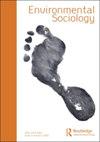The rise and fall of GMOs in politics: party positions and mainstream party behaviour in Western Europe
IF 2.8
Q3 ENVIRONMENTAL STUDIES
引用次数: 1
Abstract
ABSTRACT Social and environmental scientists usually argue that political parties hold hostile positions towards GMOs, yet we are confronted with a lack of systematic comparative analyses in the West European context. Conducting a quantitative content analysis of 265 election manifestos in seven Western European countries from 1990 until 2020, we test this assumption and explore the salience of GMOs in election manifestos and the positions of political parties on this domain. Our findings reveal that GMOs are neither a particular salient nor ignored issue by political parties and that most party families do tend to reject GMOs. Mainstream parties are more likely to talk about GMOs and to take a critical stance during periods of high mobilization of anti-GMO movements. Additionally, we hypothesize that the presence of a Green party in the national party system may make a difference. The findings provide insights into mainstream parties’ behaviour on niche issues and information for the scientific community about how political parties may become less hostile towards GMOs.转基因生物在政治中的兴衰:西欧政党立场和主流政党行为
摘要社会和环境科学家通常认为,政党对转基因生物持敌对立场,但我们面临着缺乏西欧背景下的系统比较分析的问题。从1990年到2020年,我们对七个西欧国家的265份竞选宣言进行了定量内容分析,检验了这一假设,并探讨了转基因生物在竞选宣言中的重要性以及政党在这一领域的立场。我们的研究结果表明,转基因生物既不是一个特别突出的问题,也不是政党忽视的问题,大多数政党家庭确实倾向于拒绝转基因生物。主流政党更有可能谈论转基因生物,并在反转基因运动高度动员期间采取批评立场。此外,我们假设绿党在国家政党体系中的存在可能会产生影响。这些发现为主流政党在利基问题上的行为提供了见解,并为科学界提供了政党如何减少对转基因生物的敌意的信息。
本文章由计算机程序翻译,如有差异,请以英文原文为准。
求助全文
约1分钟内获得全文
求助全文
来源期刊

Environmental Sociology
ENVIRONMENTAL STUDIES-
CiteScore
4.60
自引率
12.00%
发文量
34
期刊介绍:
Environmental Sociology is dedicated to applying and advancing the sociological imagination in relation to a wide variety of environmental challenges, controversies and issues, at every level from the global to local, from ‘world culture’ to diverse local perspectives. As an international, peer-reviewed scholarly journal, Environmental Sociology aims to stretch the conceptual and theoretical boundaries of both environmental and mainstream sociology, to highlight the relevance of sociological research for environmental policy and management, to disseminate the results of sociological research, and to engage in productive dialogue and debate with other disciplines in the social, natural and ecological sciences. Contributions may utilize a variety of theoretical orientations including, but not restricted to: critical theory, cultural sociology, ecofeminism, ecological modernization, environmental justice, organizational sociology, political ecology, political economy, post-colonial studies, risk theory, social psychology, science and technology studies, globalization, world-systems analysis, and so on. Cross- and transdisciplinary contributions are welcome where they demonstrate a novel attempt to understand social-ecological relationships in a manner that engages with the core concerns of sociology in social relationships, institutions, practices and processes. All methodological approaches in the environmental social sciences – qualitative, quantitative, integrative, spatial, policy analysis, etc. – are welcomed. Environmental Sociology welcomes high-quality submissions from scholars around the world.
 求助内容:
求助内容: 应助结果提醒方式:
应助结果提醒方式:


